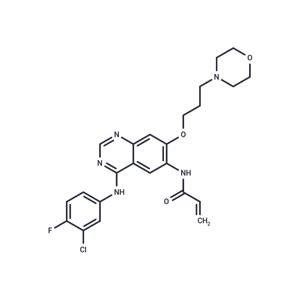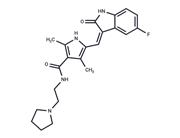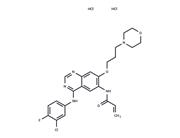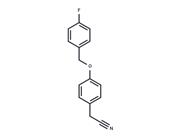| Name | Canertinib |
| Description | Canertinib (CI-1033) is a pan-erbB tyrosine kinase inhibitor which work against esophageal squamous cell carcinoma in vitro and in vivo. Canertinib treatment significantly affects tumour metabolism, proliferation and hypoxia as determined by PET. |
| Cell Research | Cells (1 × 104) are seeded in each well of a 24-well plastic culture plate and left overnight in DMEM or RPMI-1640 supplemented with 10% FBS. The next morning, the cells are treated with the indicated concentrations of CI-1033 (0.1-5.0 nM) for varying periods (1, 3, 5 and 7 days). After treatment, the cells are counted using a Coulter counter. The percent of cell proliferation is calculated by this formula: treatment cell number/control cell number × 100 for each time period.(Only for Reference) |
| Kinase Assay | Tyrosine Kinase Assays: Enzyme assays for determination of IC50 are performed in 96-well filter plates in a total volume of 0.1 mL, containing 20 mM Hepes, pH 7.4, 50 mM sodium vanadate, 40 mM magnesium chloride, 10 μM adenosine triphosphate (ATP) containing 0.5 mCi of [32P]ATP, 20 mg of polyglutamic acid/tyrosine, 10 ng of EGFR tyrosine kinase, and appropriate dilutions of CI-1033. All components except the ATP are added to the well and the plate is incubated with shaking for 10 min at 25 °C. The reaction is started by adding [32P]ATP, and the plate is incubated at 25 °C for another 10 min. The reaction is terminated by addition of 0.1 mL of 20% trichloroacetic acid (TCA). The plate is kept at 4 °C for at least 15 min to allow the substrate to precipitate. The wells are then washed five times with 0.2 mL of 10% TCA and 32P incorporation determined with a Wallac β plate counter. |
| In vitro | CI-1033 shows excellent potency for irreversible inhibition of erbB2 autophosphorylation in MDA-MB 453 cells. CI-1033 also shows high permeability in Caco-2 cells and inhibits secretory transport of vinblastine, which indicates that CI-1033 is a likely inhibitor of the P-gp. [1] CI-1033 alone, significantly suppresses constitutively activated Akt and MAP kinase. In combination with gemcitabine, CI-1033 inhibits Akt and prevents increased levels of MAPK phosphorylation. CI-1033 stimulates p27 expression and p38 phosphorylation in MDA-MB-453 cells. [2] CI-1033 is highly specific to the erbB receptor family and not sensitive to PGFR, FGFR or IR even at 50 μM. CI-1033 shows high levels of inhibition in A431 cells expressing EGFR with IC50 of 7.4 nM. CI-1033 suppresses heregulin-stimulated tyrosine phosphorylation of erbB2, erbB3 and erbB4 with IC50 of 5, 14 and 10 nM, respectively. CI-1033 also inhibits expression of pp62c-fos in response to heregulin. [3] CI-1033 is predicted to modify Cys773 covalently within the ATP binding site of the HER2 kinase and enhances destruction of both mature and immature ErbB-2 molecules. [4] CI-1033 induces a significant decrease in measurable phosphorylation of tyrosine residues 845 and 1068 of EGFR, which are responsible for Src and Ras/MAPK signaling respectively. The corresponding residues of Her-2, tyrosine residues 877 and 1248 are dephosphorylated significantly by CI-1033 at a concentration of 3 μM or higher. CI could block EGFR internalization and increase the rate of apoptosis in primary osteosarcoma cells in a titratable fashion. [5] In addition, CI-1033 inhibits the proliferation of TT, TE2, TE6 and TE10 cells significantly at 0.1 nM. [6] |
| In vivo | Canertinib shows impressive activity against A431 xenografts in nude mice at 5 mg/kg of body weight. [1] Canertinib (20 to 80 mg/kg/d) achieves a high degree of tumor regressions in H125 xenograft models. [3] Oral administration of Canertinib causes a marked inhibition of growth in TT, TE6 and TE10 xenografts in nude mice, without animal death and <10% weight loss. [6] |
| Storage | Powder: -20°C for 3 years | In solvent: -80°C for 1 year | Shipping with blue ice. |
| Solubility Information | DMSO : 4.86 mg/mL (10 mM), Sonication is recommended.
|
| Keywords | ErbB-1 | inhibit | Inhibitor | Epidermal growth factor receptor | PD 183805 | HER1 | CI1033 | Orthopoxvirus | PD183805 | Canertinib | EGFR | CI 1033 |
| Inhibitors Related | Osimertinib | Lidocaine Hydrochloride hydrate | Lapatinib | Afatinib Dimaleate | Erlotinib hydrochloride | Erlotinib | Neratinib | Chalcone | Genistein | Gefitinib |
| Related Compound Libraries | Bioactive Compound Library | Membrane Protein-targeted Compound Library | Tyrosine Kinase Inhibitor Library | Kinase Inhibitor Library | Anti-Cancer Clinical Compound Library | Drug Repurposing Compound Library | Inhibitor Library | Bioactive Compounds Library Max | Anti-Cancer Active Compound Library | Anti-Cancer Drug Library |

 United States
United States



